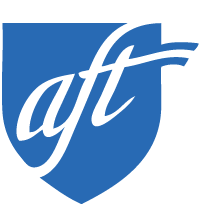A torrent of censorship
As someone who cares deeply about public education and who worries about our democracy, I am concerned about both.

Weingarten, front, helping distribute 40,000 free books in Cleveland on Dec. 12, 2022. Photo by Leslie K. Getzinger
Nearly 250 years since our country’s founding, some Americans are still attempting to restrict others’ basic freedoms. If you are a student in Duval County, Fla., you are not free to read the book Roberto Clemente: Pride of the Pittsburgh Pirates because it has been banned from school libraries. Young people in McMinn County, Tenn., aren’t free to read Maus, a graphic novel about the Holocaust, because officials would rather “teach a nicer Holocaust,” as the author has suggested. These books and many more, including books about Ruby Bridges and even Anne Frank’s diary, have been caught up in a torrent of censorship in the last two years. PEN America’s Index of School Book Bans identified 2,532 books banned from July 2021 to June 2022 alone.
The freedom to read has come under particularly ferocious assault in Florida under Gov. Ron DeSantis. Images have emerged of school libraries in Florida with every book removed and classroom bookshelves covered by tarps and signs warning, “Books are NOT for student use!!” DeSantis signed a law that makes distributing vaguely described “harmful materials” to minors a third-degree felony, with penalties for teachers of up to five years in prison and a $5,000 fine. DeSantis is using children and educators as pawns in service of his political ambitions.
Teachers’ freedom to teach also has come under assault, including in colleges. DeSantis has expanded his attack on Advanced Placement African American studies to all AP courses. A recent Rand report, “Walking on Eggshells,” would be more accurately titled “Teaching on Eggshells.” The report finds that at least one-quarter of teachers in the United States have changed instruction or curriculum in response to education censorship around race and gender. Even in districts without explicit restrictions, 22 percent of teachers reported making changes.
Public schools have become this cultural battlefield even though they should be insulated from politics and culture wars so they are free to fulfill the fundamental purposes of public education: To help nurture the citizens of a democratic society. To help all young people acquire the knowledge and skills necessary to succeed in life. To enable students to learn and think critically about the past so we can create a better future. To learn in safe and welcoming environments where they can thrive. And to ensure that all students have access to schools not segregated by religion, race or ethnicity, but public schools for the common good.
Ninety percent of students in the United States attend public schools—reflecting America’s wonderful diversity. Education is one of the best tools to see the value of other people’s experiences and to overcome prejudice. The values of equity, empathy, inquiry and democracy should be reflected in what our children are taught at the appropriate age and in the books available to them.
PEN America, which monitors threats to free expression, found that proposed educational gag orders increased 250 percent from 2021 to 2022. These are state legislative efforts to restrict teaching about topics such as race, gender, American history and LGBTQIA+ identities in K–12 and higher education. Proposed gag orders increasingly impose harsh punishments, including heavy fines or loss of state funding for institutions, and termination or even criminal charges for teachers.
As someone who cares deeply about public education and who worries about our democracy, I am concerned about both.
In Florida and elsewhere, censoring books is part of larger efforts to exert greater control over and undermine education. Culture-war orchestrator Christopher Rufo detailed the strategy for replacing public education with a universal voucher system. “To get to universal school choice, you really need to operate from a premise of universal public school distrust,” Rufo has said. “You have to be ruthless and brutal.” These are chilling words from the man DeSantis has tapped to lead a conservative overhaul of higher education in Florida.
Censoring books often is just the beginning. In the early 1930s, Nazi party members burned books deemed to have an “un-German spirit,” many written by Jewish intellectuals and cultural figures. During the Cultural Revolution in China, authorities censored books and conducted public book burnings. Autocratic and authoritarian governments throughout different eras have subverted public education to control what citizens learn about their country and the world, and to reduce resistance.
As others are banning books, the AFT is giving them away. We are on our way to giving away 2 million free books to children—books with diverse titles and characters.
Last month, retired teacher Lisa Superina attended a rally in Melbourne, Fla., protesting book bans. The former Italian teacher offered a history lesson:
“Fascism isn’t just going to show up one day and say, ‘I’m here,’ and take all your rights away. It’s creeping in, in increments … and they’re starting with the books.”
Pay attention, because if we’re not vigilant, books will be just the beginning.
A message from our Publisher & CEO Rachel Fishman Feddersen

I hope you appreciated this article. Before you go, I’d like to ask you to please support the Forward’s award-winning, nonprofit journalism during this critical time.
We’ve set a goal to raise $260,000 by December 31. That’s an ambitious goal, but one that will give us the resources we need to invest in the high quality news, opinion, analysis and cultural coverage that isn’t available anywhere else.
If you feel inspired to make an impact, now is the time to give something back. Join us as a member at your most generous level.
— Rachel Fishman Feddersen, Publisher and CEO















